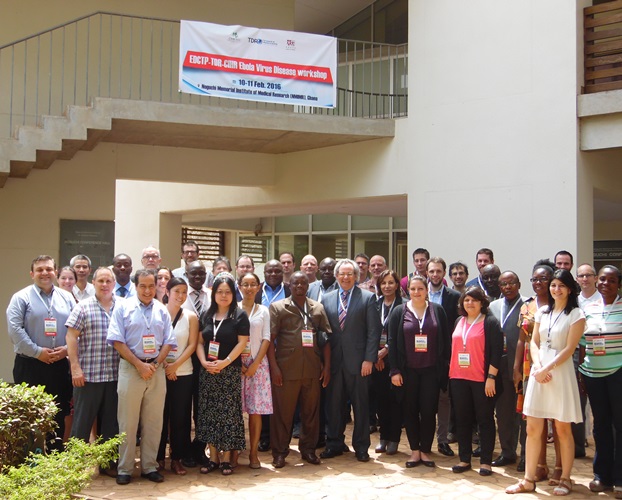Ebola grantees have begun collaborations
Grantees recently selected to conduct a range of research from basic science to implementation research, including capacity development and models of clinical care, have met for an Ebola Virus Disease (EVD) workshop on 10-11 February 2016 in Ghana to share their planned studies, identify collaborations and finalise project plans.
Six grantees are funded by the European & Developing Countries Clinical Trials Partnership (EDCTP), UK Medical Research Council (MRC), National Health Research Institute Carlos III, and the Special Programme for Research and Training in Tropical Diseases (TDR). Another 12 grantees are funded from a separate Canadian Institutes of Health Research (CIHR) grant competition. Coordination between the funders on these calls for proposals from which successful projects have been funded is in keeping with the objectives of the GLOPID-R (Global Research Collaboration for Infectious Diseases Preparedness), and culminated in the organisation of this workshop, bringing 32 collaborators from the 18 grantees together. Each project contains collaborations between African and northern institutions (Europe and Canada).
Workshop at University of Ghana
The workshop, hosted by the Noguchi Memorial Institute of Medical Research at the University of Ghana and chaired by Dr Thomas Nyirenda of EDCTP and Dr Marc Ouellette of CIHR, provided a networking platform for both information exchange and learning. Each grantee presented their project plans and case studies and lessons learnt from the Ebola crisis, mainly in West Africa, were also summarised. Dr Francis Kateh, Deputy Minister of Health Services & Chief Medical Officer for Liberia, presented on Liberia’s Ebola outbreak management, post-outbreak efforts and the need for greater research capacity there. Professor Fred Binka, Foundation Vice-Chancellor of the University of Health and Allied Sciences in Ghana, reviewed ethical and regulatory dilemmas that had been encountered in Ghana with early phase clinical trials during the recent EVD outbreak and emphasised the importance of strategic community engagement and the education of all stakeholders from an early stage in the research planning and its conduct.
Grantees explored a variety of approaches to learn from one other, complement each other’s efforts, broaden stakeholder involvement and maximise the impact of the projects. Feedback from participants on research gaps and future funding needs are expected to contribute to the funders’ future strategies and it is hoped that the meeting will have fostered future collaboration between the funders, different regions of Africa and the grantees from both north and south.

